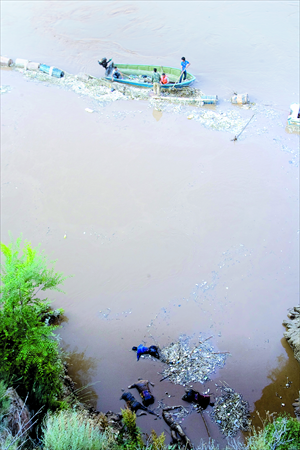Watery grave

There's a time-honored insult that often arises during heated arguments between people in towns that line the Yellow River: "If you can't bear the situation, jump into the river and end your life," as the barbed phrase goes.
While the words are often uttered as an angry curse, many people have literally heeded the advice. At least 10,000 bodies have been recovered along an 80-kilometer stretch of the Yellow River's Lanzhou section in Northwest China's Gansu Province since the 1960s. Around 300 bodies are pulled from the river annually, according to local authorities and corpse collectors who work on the river.
Some of the bodies are returned to relatives, while others are retrieved and cremated by the local civil affairs department. However, many are left flowing along the Yellow River.
Police, body collectors and officials from the civil affairs and environmental departments are often at loggerheads with how to deal with the bodies and the pollution and contamination problems they pose to the river's ecosystem.
Family of body collectors
Wei Zhijun, a fisherman-turned-body collector from Xiaheba village in Lanzhou, drags hard on his cigarette as he surveys the river through lingering fog early one morning. He navigates his boat gently through a sea of garbage as he arrives at floating corpses covered in birds and flies. His job is to retrieve bodies and return them to family members.
Wei's father, Wei Yingquan, started collecting garbage in 2005 near a local hydropower station at the Shichuan section of the Yellow River. Wei Zhijun decided to follow in his father's footsteps, becoming a key member of a family of river scavengers that also includes other male relatives.
"We sit on stools near the river, where we can spot bodies flowing down the river. It doesn't take long to collect the bodies and tie them to the trees downstream," Wei Yingquan said, gesturing to boats and stone cottages built to store the bodies.
Their first task upon locating a body is to check for any items that might help them identify the deceased person, such as a cellphone or wallet with ID or bank cards, so family members can be contacted. This year the team has been able to identify 20 bodies, roughly half of the total they have retrieved.
Media reports in 2006 claimed the Wei family can make up to 100,000 yuan ($15,924) annually from collecting bodies. Their grim job and culturally superstitious omens associated with their line of work has led to some villagers being wary or even scared of the family.
The family admits collecting bodies is a profitable business, saying people who wish to inspect corpses must pay fees ranging from 500 yuan to thousands of yuan to cover the cost of fuel for the Weis' boat.
Favored river for suicide
Most of the dead found in the Yellow River are suicide victims.
Suicide is the cause of death for 85 percent of bodies found, with around 10 percent victims of accidental deaths and 5 percent representing dumped murder victims.
There are no statistics showing exactly how many corpses flow in the river at any one time. The Lanzhou Morning Post reported in 2009 that nearly 300 suicide victims were recovered from the river, with 30 percent of them unable to be identified.
Lanzhou police opened a station on the river's banks in 1980 to coordinate the recovery of bodies.
But a surge in people using the river to commit suicide coupled with regular fatal accidents from fishermen overwhelmed police, leading them to enlist the help of volunteers to prevent such deaths.
"I have saved five people this year, mostly students playing near the river on holidays," said Luo Yuanmao, who has a business near the Baitashan pier in Lanzhou.
Luo said police are primarily called to collect bodies in the river of drowned swimmers, most either middle-aged or elderly.
Environmental impact
The Yellow River's floating population of corpses has not only triggered debate over suicide prevention, but also raised concerns about the environmental toll that has been taken.
A 2005 report by the local Daxia Hydropower Company found that bodies left to stew in the river pose a significant threat to the ecosystem.
"If these bodies are left untreated in the water to decompose, the ensuing impact of pollution is far more severe than that caused by the dumping of household waste. But procedures are complicated to properly dispose of these corpses, so many law enforcement departments are unwilling to get involved in the problem," the report said.
The company complained that contamination is often caused because bodies can't be disposed of properly due to the possibility that some people might be homicide victims. Instead, they are left to float in a reservoir amid hope that families of the victims will come forward to identify them. However, many are also allowed to float on downstream to pass the problem onto another community.
Upstream at the Xiaoxia hydropower station, the problem of floating bodies has caused bigger problems for local villagers. With no access to tap water, they must instead rely on fetching pails of water directly from the Yellow River to store in their wells.
But the polluted water is only processed with simple bleaches and other chemicals, meaning it is unsafe to drink.
An official from the Lanzhou environmental protection department said that floating bodies contaminated water only along certain sections of the river, but added it was hard to evaluate how much damage overall has been done to the Yellow River's ecosystem.
Oriental Morning Post